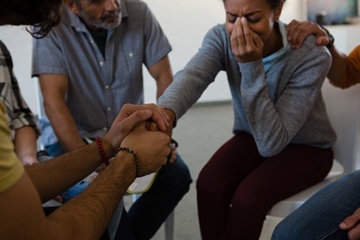Depression
Depression is a common mental disorder that includes intense sadness and a loss of interest in activities that you normally enjoy. It’s also accompanied by symptoms such as, the inability to carry out daily activities, reduced concentration or loss of energy for a period of at least 2 weeks.
One in three South Africans suffer from depression in their lifetime and though it is a treatable condition, oftentimes people suffer in silence because many don't consider it a 'real illness', or because they feel embarrassed to ask for help.
*Estelle Carstens, a working mother has suffered 3 bouts of major depression. She suffered from post-natal depression, depression and generalised anxiety. This later fuelled the beginning of agoraphobia (fear of open places).
*Name has been changed.
Warning signs
According to the Diagnostic and Statistical Manual of Mental Disorders (DSM-5) (a manual doctors use to diagnose mental disorders), you have depression, when you have 5 or more of these symptoms for at least 2 weeks:
 Having a depressed or sad mood most of the day.
Having a depressed or sad mood most of the day.- Feeling tired or have a lack of energy almost every day.
- Feeling worthless or guilty almost every day.
- Having a hard time focusing, remembering details, and making decisions.
- Changes in sleeping habits - that include not being able to sleep, or sleeping too much almost every day.
- No interest or pleasure in many activities you usually enjoy.
- Think often about death or suicide (not just a fear of death).
- Feeling restless, irritable or angry.
- Experiencing changes in eating habits or unexplained weight loss or weight gain.
Estelle started seeing small changes in her routine, “I first noticed that I had very little energy and that my thoughts were negative and dark. It meant that I found no joy in the things and people that meant the world to me. All I wanted to do was to sleep and cry. My panic attacks and anxiety were so bad that I started feeling scared to leave the safety of my home. One day, while I was on my way to work, I had an urge to jump in front of the train. I had to stop myself and this was the turning point for me”.
Depression can affect anybody at anybody at anytime, but is often triggered by different major life events. Estelle’s started with major life changes, such as the death of one of her parents, the birth of her child and other stressors.
Risk factors
Genetics: A history of depression in your family may make it more likely for you to get it. It's thought that the condition can be passed down. The exact way this happens, though, isn't clear.
Death or loss: Sadness and grief are normal reactions but sometimes, such big stresses can bring serious symptoms of depression.
Conflict: Personal turmoil or disputes with family or friends may lead to depression.
Abuse: Past physical, sexual, or emotional abuse can bring on depression as well.
Life events: Many stressful changes in your life can cause depression. Even good things, like moving or graduating, could make you depressed.
Although therapy and anti-depressants are effective means to treat depression, The South African Depression and Anxiety Group (SADAG) recommend a few cost-effective ways to help treat depression yourself.
 Empower yourself with knowledge - the more you understand about mental health, the better you will be able to handle your condition.
Empower yourself with knowledge - the more you understand about mental health, the better you will be able to handle your condition.- Make sure you eat a balanced diet and avoid tobacco and alcohol products.
- Get regular exercise, even just a short walk around the block can be beneficial.
- Keep a journal and write your feelings down. Let your family and friends help you.
- Try to do the things you remember enjoying before the onset of your depression.
- Surround yourself with positive influences, and share your feelings with someone. It’s usually better than being alone and secretive.
- Break large tasks into small ones and set priorities. Do what you can when you’re able to.
“I’m in a very good space mentally. I take my anti-depressants daily and I have tranquilisers in case of a panic attack (which I don’t use at all). I saw a very good therapist who assisted me in dealing with and managing my depression and anxiety. I’ve learnt to control my negative thoughts, breathing exercises help with the anxiety and my faith keeps me grounded”, says Estelle.
Different forms of depression
There are a few types of depressive disorders that doctors can diagnose, including:
- Unipolar major depression.
- Persistent depressive disorder, also called dysthymia, when depression lasts for at least 2 years.
- Disruptive mood dysregulation disorder, when children and teens get extremely irritable, angry, and often have intense outbursts that are more severe than a child’s typical reaction.
- Premenstrual dysphoric disorder, when a woman has severe mood problems before her period, more intense than typical premenstrual syndrome (PMS).
- Substance-induced mood disorder (SIMD), when symptoms happen while you’re taking a drug or after you stop.
- Depressive disorder due to another medical condition.
- Other depressive disorders, such as minor depression.
Offering support to a loved one 
A support structure is very important when you’re dealing with depression. Estelle was fortunate enough to have a supportive and loving husband who attended all of her therapy sessions with her and made sure she’s on the road to recovery. “Although depression is debilitating and you feel at that moment that you’ll never be whole again, it’s temporary. Get treatment as soon as you can and find those people who can support you through it. I’ve been in very stressful situations afterwards that didn’t trigger my anxiety and depression like I thought it would. I am free”, says Estelle.
Where to get help?
If you or someone you know has symptoms of depression, talk to your doctor. You can also contact SADAG to speak to a trained counsellor.
- SADAG’s 24hr Helpline 0800 456 789
Cape Mental Health is also available for information session, assessments and counselling.
- Call 021 447 9040 or email Ingrid Daniels on Ingrid@cmh.org.za.
Although there’s still a lot of stigma attached to depression and taking anti-depressants, it’s good to remember that depression is an illness, just like hypertension and diabetes. You’ll take medicine for chronic illnesses if you need to. The same should apply to depression.
There’s no shame in being depressed. There are more people leading healthy and active lives by managing this illness by taking anti-depressants. You can as well.


